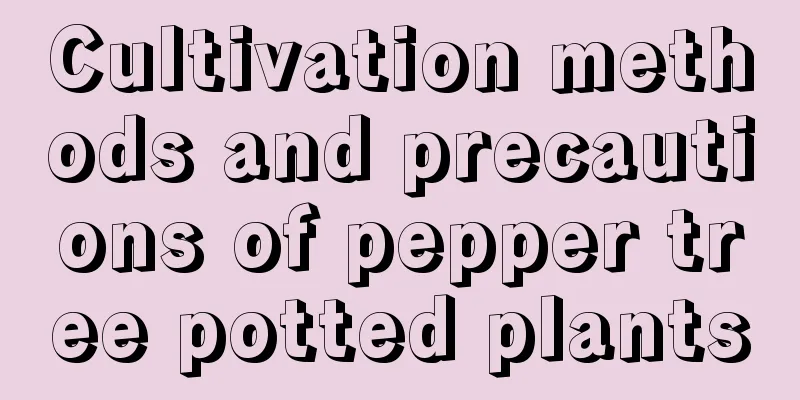Cultivation methods and precautions of pepper tree potted plants

|
Pepper tree is a very popular potted plant. It has an upright plant shape, lush branches and leaves, and small yellow flowers, which makes it highly ornamental. Here are some tips on growing pepper tree in pots and what to look out for. 1. Flowerpot selection Pepper tree bonsai is not resistant to waterlogging, so there are strict requirements on the selection of pots. Try to use pots with good air permeability and drainage. Generally, glazed pottery pots and purple clay pots are preferred. 2. Soil selection The pepper tree bonsai prefers loose, fertile, breathable, well-drained, slightly acidic sandy soil. When preparing the soil, it is generally prepared with garden soil containing humus, organic fertilizer , and coarse sand in a ratio of 2:2:1. Because it is not resistant to waterlogging, a 2-3 cm layer of coarse sand can be placed at the bottom of the pot before planting to allow water to flow through. 3. Trimming and shaping The pepper tree bonsai grows slowly, and in principle, the pruning force should not be too strong, so if we want to maintain a good shape, we must use coiling as the main method and pruning as the auxiliary method. The best time to prune is in spring. Although pruning is possible in winter during the dormant period, considering the later growth recovery and wound healing, pruning is best done in the afternoon on a sunny day in spring. Prune the dense branches, old, weak and diseased branches to improve ventilation and light transmission and reduce the occurrence of diseases and pests. 4. Suitable temperature for growth The suitable temperature for the growth of pepper tree bonsai is 20-30℃. The temperature is high and sultry in summer, so we must shade and moisturize it in time, move it to a cool and ventilated place, and spray water on the leaves in time. The temperature is low in winter. When the temperature is below 10℃, growth stops; when it is below 4℃, it is easy to get frostbite, so we still have to take good insulation measures. 5. Water appropriately The pepper tree bonsai is not tolerant to waterlogging, so the soil in the pot must not be waterlogged. During the growing season, the soil in the pot should be kept moist. In the hot and dry season and winter, water should be sprayed on the bonsai leaves and the environment to maintain relative humidity. Generally water once every 3-5 days, and water thoroughly. 6. Fertilization management The pepper tree bonsai requires a large amount of fertilizer. During the growth period, apply a thin liquid fertilizer every 15 days. After the Mid-Autumn Festival, you can apply 1-2 times of concentrated potassium dihydrogen phosphate solution to increase the plant's winter resistance and disease resistance. 7. Notes When tying the branches with palm fiber, if the branches are too smooth, you can wrap them with a layer of cotton cloth before tying them. When using palm fiber to wrap, be sure not to expose it, otherwise it will easily affect the appearance. In addition, when tying the branches, try to make the main branches appear twisted, and try to make the other twigs as natural as possible. That’s it |
<<: When is the best time to plant tomatoes?
>>: When is the best time to plant cabbage?
Recommend
Turtle breeding methods and technical points
The soft-shelled turtle has tender meat, rich nut...
Can water hyacinth be planted in soil?
Can water hyacinth be planted in the soil? Water ...
Can a section of Christmas cactus be propagated by cuttings?
1. Is it possible? If the conditions are not met,...
Common pests of monkey orchid and their control methods
Common pests of monkey orchid: aphids Symptoms of...
What soil is suitable for growing garlic?
Garlic Introduction Garlic prefers cool, high-sun...
How to water the gourd
Importance of watering for gourds The growth rate...
How to grow copper coin grass in winter
Winter farming in northern areas When growing pen...
The efficacy and function of papaya, how to eat papaya to make breasts bigger
1. How to eat more breasts 1. Papaya milk juice: ...
Cultivation methods and precautions of water gardenia
1. Maintenance methods 1. Soil: The soil should b...
How to grow money grass in water, what to do if the roots of money grass rot in water
1. Water culture method 1. Water quality requirem...
How to grow Violet Queen succulent
1. Breeding techniques 1. Soil: The soil used to ...
Cultivation methods and precautions of Araucaria heterophylla
Araucaria heterophylla is a relatively easy plant...
Will newly planted succulents die if they are watered?
1. Will I die? There is no need to water newly pl...
Kidney bean planting time and method cultivation technology
Kidney bean planting time Kidney beans can be cul...
Cultivation and care of Christmas cactus in spring, is it better to change the pot in spring or autumn?
1. Cultivation and care of Christmas cactus in sp...









